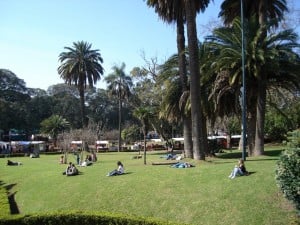How many people do you think head off backpacking around South America each year? Quite a few.
How many people do you think take the trouble to learn Spanish whilst they’re there? Hmm… not quite as many, I suspect.
In this post we talk about where you should study Spanish in South America. I take a reader question from Meagan, get input from Spanish experts from around the web and draw up an action plan for a Spanish-learning trip to South America. Read on!
Pro Tip
By the way, if you want to learn Spanish fast and have fun while doing it, my top recommendation is Spanish Uncovered which teaches you through StoryLearning®.
With Spanish Uncovered you’ll use my unique StoryLearning® method to learn Spanish naturally through story… not rules. It’s as fun as it is effective.
If you’re ready to get started, click here for a 7-day FREE trial.
Hit play on the video below if you want to watch the video version of this post. Otherwise keep scrolling to discover the best place to learn Spanish in Latin America.
Learning Spanish While Backpacking
Although most people who go to South America probably don’t get beyond learning the basic greetings and learning to count (primarily to be able to order the right number of beers!), there are plenty of people who genuinely set out to learn Spanish on their trip.
Meagan is one of those people. She read my post on learning Spanish while backpacking in South America, and spotted the one gaping hole in the article… it’s all very well having some ideas on how to learn Spanish, but what about where?
Enter Meagan.
I just read your post on learning Spanish while backpacking in South America, which is what I'm in the process of planning for early next year. In the comments I read that if you could, you would go back to Buenos Aires in a flash. I was wondering what you think of learning Spanish there (I pretty much have no Spanish knowledge) as I heard their dialect can be more difficult to learn and also to use in other Spanish speaking countries. I was wondering what you think of this, and if you think it is true, where you think might be a better place to learn Spanish so that it's easier to continue using throughout my travels in South America and eventually Spain.
What a great question!
To answer it, let’s begin by talking about Argentina and whether it’s a good idea to learn Spanish there. After that, Meagan describes her plans in more detail and I’ll outline what I would do to learn as much Spanish as possible in her position.
Argentine Spanish
The first thing to say is that wherever you go in the Spanish speaking world there are differences. Different vocabulary, different accents, sometimes different grammar. While this may at first sound like a big deal, it's really not
Try comparing the English spoken in the following places:
- East London
- Liverpool
- Glasgow
- Belfast
- New York
- Texas
- Johannesburg
Now ask yourself this: if someone who is from one of these places visited another place on the list, would they have any major problems?
Clearly not. OK, a Texan might have trouble at first understanding a table full of drunken Glaswegians arguing in the pub, but if he wanted to sit down and have a chat with them, he could do it.
Over the course of the evening, his ear would get accustomed to their accent, they would cut back on the local slang a bit, and they’d reach a happy compromise.
The same thing applies to accents in Spanish.
Sure, they use some different words in Argentina, Mexico and Spain, but it’s no big deal. Would people have a little laugh at your expense if you moved to Madrid with an Argentine accent? Probably. But who cares. Within a few weeks you’d be speaking just like them.
When I went to Spain after living in Argentina, my friends (who I’d known before going to Argentina) had a good laugh at me.
“Dios mío, vino hablando Argentino!”
But like I said, it was soon forgotten. When I met new people, the fact I had a slightly different accent often proved a good thing, as we had something to talk about!
“Porque hablas así, tio? Viviste en Argentina o que?”
The broader point is that, for Meagan, because she’s a beginner, she's unfortunately still going to sound “foreign” even after a month's study. That “foreignness” is going to be way more noticeable to people she talks to on her travels than the particular accent she may pick up. So much so that, in my opinion, it makes the accent thing a non-issue.
Before you get really good at a language, you’re only really concerned with one thing: getting basic meaning across. And whether you do that with a Vos, Tú or Usted, with an accent from Buenos Aires, Sevilla or Medellín, is neither here nor there.
Learning Spanish In Argentina
I lived in Argentina for 6 months back in 2005. There are so many great things about Argentina that I don't know where to start, but to name a few…
- People are friendly, generous and welcoming. They love everything “culture” and Buenos Aires is a melting pot of cultural activity that will blow your mind. All this means that meeting people is easy, which makes the task of learning Spanish a lot easier. I met so many people who very quickly became great friends, and I miss them all a lot!
- It is probably the best country for outdoor travellers in the world. Mountains, vineyards, glaciers, ranches, tropical rainforest, indigenous tribes, waterfalls that will leave you breathless, marine parks, national parks, skiing, a lake district that defies belief, and the Southern-most point on Earth (apart from Antarctica). Have I missed anything?
- A unique style of Spanish, which although quite different from other varieties, is beautiful. As expressive and melodic as Italian, and rammed full of delicious slang to get your teeth into 🙂
So, to recap…
Would I go back to Argentina in a flash? Yes. Is it a good place to learn Spanish? No question. Is the accent a problem? Not for a beginner on a short stay – the progress you make is way more important than the accent you pick up.
Thoughts From Spanish Experts
But hey – enough from me!
Not everyone has the same tastes as me (not everyone loves steak, wine and tango in Buenos Aires… can you believe it??) 🙂
I asked some Spanish pros from around the internet what they would recommend Meagan to go to learn Spanish.
1. Rob
For me, you can’t beat Colombia! Colombia as a country has a bit of everything to offer, and is a kind of microcosm of South America. You’ll learn Spanish quickly there, and here’s why:
- Friendly, gregarious, outgoing people. These people will bring you out of your shell if you’re shy, and you’ll get to practise your Spanish a lot, no matter your level.
- Crystalline Spanish accent. Liz (the other half of Spanish Obsessed) is from Bogota, and has an accent typical of central Colombia. It’s a melodious and rhythmic accent, without too many strange contractions.
- Great country. You’ll have a fantastic time in Colombia, and it’s far safer than it used to be. All Latin American countries carry some sort of risk, but by taking sensible precautions you should have no problems.
2. Andrew
If you're interested in learning Spanish, especially if you're more interested in Latin American Spanish than Peninsular Spanish (Spanish from Spain), which is most Americans and Canadians because they're much more likely to encounter a Latin American than a Spaniard, then I really recommend Colombia in general and the Bogotá area in particular.
The reason for this is that Colombians are known throughout Latin America for having very clean, grammatically correct Spanish with a very neutral accent, thereby making their Spanish easy to understand and very proper-sounding.
If you were going to learn a specific dialect and accent that you would want to be the best general accent and dialect for use throughout Latin America, that would be the dialect and accent from the Bogotá region of Colombia.
Everyone will be able to understand you and you won't have any sort of thick or difficult to understand accent. Colombians are severely overrepresented as TV and radio announcers for Latin American stations that broadcast in multiple countries for precisely this reason: they speak very correct Spanish with a neutral accent and everyone can understand them, no problem.
Check out Andrew's Spanish learning site at How to Learn Spanish.
3. Conor
The best country for a complete beginner of Spanish in South America depends on the personal preferences for lifestyle of the learner. That said, my personal recommendation would be Colombia.
Most accents in the country are clear and therefore, easy to understand – a boon for a complete beginner in Spanish. The country is stunningly beautiful and its geography diverse with mountains, Pacific and Caribbean coastlines, plains and rainforest.
Security has gradually improved over the last decade and the country is no longer as badly blighted by the paramilitary conflicts and crime that had previously hindered its tourist potential. The cost of living is also relatively low.
Moreover, Colombia boasts superb cultural attractions in architecture, art, music and food, especially in its principal cities of Bogotá, Cartagena, Medellín, Cali and Barranquilla. Go Colombia!
You can find Conor at the Language Tsar website.
4. Amit
One very important point to consider while choosing Latin America for a Spanish immersion program is the influence of indigenous languages. For example, Quechua heavily influences the Spanish of Peru, Bolivia, and Ecuador, as Nahuatl does Mexico.
Being a US territory, Puerto Rico is perhaps your worst bet as it’s more Spanglish than Spanish out there! The Spanish of Bogotá, Colombia, is particularly respected for being one of the very few that have remained largely unaffected. Cali and Medellin are generally better bang for the buck than Bogotá in terms of living expenses and immersion experience.
But then, if expense is a factor, nothing beats Guatemala. Argentina’s accent can be a tad hard to get and the prevalent voseo is a very local phenomenon not very useful elsewhere. There are, however, a large number of people who find the Argentinian dialect quite sexy. It all comes down to your personal preferences.
All said and done, no immersion program is going to be any good unless you have a reasonable experience of your own with the language you are targeting. Try to artificially immerse yourself in Spanish for at least a couple of months at home (yes, it’s possible!) before you pack your bags. This will help you get started when the locals start rattling off their Spanish at you.
Building a Spanish immersion ecosystem at home is the single most important step in your Spanish program if you wish to make the most out of your trip; otherwise a mere 2-month stay will hardly give you any proficiency.
Find Amit at Always Spanish.
5. Julio
I would recommend Mexico because this country is the most populated of all the Spanish-speaking countries, ahead of Spain, Colombia, Argentina and several others. Also, Mexico exports many TV Soap Operas and many other programs that are transmitted in other Latin American countries.
Mexico is a big country that offers you different types of weather and there are a lot of varieties of people, food, culture and many other things that are fascinating for foreigners. As for the accent, each region has its own accent, making them so different from each other (e.g. The Northern accent is very different of that of the South).
Briefly, I’d say that Mexico has a lot of variety, and for foreigners, it’s not so expensive – you can have a good quality of life. Besides, Mexico’s economy will be one of the strongest in the future!
Another country could be Peru. The Peruvian accent is also neutral and inside of Peru there is a variety of accents. Peru is a country full of history and a lot of culture, and besides, the cost of living is not as high as in other places and is a good place to visit and to live in.
Connect with Julio here.
Where In South America?
So, we have a variety of opinions on the best place to learn Spanish! In fact, I've only been to Brazil, Argentina and Uruguay, so I'm slightly biased on the matter 🙂
Where should Meagan go?
Well, all the places mentioned here will be great. The key to her decision is this: where will she be more at home culturally?
As you'll see in the next section, a huge amount of the progress she'll make on the trip will be down to the opportunities she gets to speak to people. Put simply, the more she likes the culture, the more she will interact with locals, in local events and goings-on. The more she interacts, the more she'll learn.
Is this really so important?
Yes. I've travelled to places before where I haven't particularly liked the city and/or the people very much (I won't say where because you wouldn't believe me!!), and that really got in the way of me wanting to go out, do things and meet people. As a result, my learning was slow. This is a big deal.
So… Buenos Aires? Medellín? Meagan needs to do a bit of research and make the call that's right for her.
Meagan's trip
Here are some more details about Meagan's plan:
Here are some more details about Meagan's plan:
Travel time is not confirmed yet, but looking at about 2.5 months.
Ideally my trip would be about both learning Spanish and traveling. I was thinking to base out of somewhere (like Buenos Aires) for a few weeks to give myself some time to focus on hopefully building a base for Spanish and allowing me time to experience one place in more depth, then continuing on traveling throughout other parts of South America and continuing to develop my Spanish.
Ideally I would spend no more than 3, maybe 4 weeks in one place as I would still like to travel to other places/countries as well.
I don't have specific plans as to how I would continue using Spanish after.
Action plan
Based on this, here is my plan-of-attack for Meagan's Spanish mission:
- With 2.5 months to play with, and with both Spanish and travelling as the aim, I'd commit to staying 4 weeks in one place, and the rest to travelling around. 4 weeks is a good time to really get some Spanish together, which can then be used for the rest of the trip.
- Arrange your accommodation in advance. You can't afford to lose a week hunting for a flat. Don't stay in hostels – at least not those populated with foreign tourists. Renting a flat is probably the most economical thing to do for a month. See here for ideas.
- When it comes to studying Spanish (as opposed to practising), there is no objective difference between doing it at home or in South America.
- So, and this is probably the most important part of all… don't wait! Start studying right away. Don't waste your precious travel time learning the basics. Do all that before you leave, then you can really make the most of being abroad with more useful stuff.
- “I can't learn at home” or “I'm too busy” are two of the most destructive fallacies of all. You can learn anywhere, and you do have time. Start by gathering some simple materials (books and podcasts) and commit to a short study routine every day. This post will show you how to build a routine. Create an immersion environment at home for better results. And see this post on fluentin3months.com for a more comprehensive look at studying remotely.
- For the 4 weeks on location, I would have private tutoring every morning for 2-3 hours, 5 days a week. This will cost a bit, but probably not as much as you think, and is well worth it. Find a tutor online before you go (use Google or even Elance) and make a deal for the length of your stay – you should be able to bargain heavily. Don't go through language schools, look for people offering private lessons. My amazing friend Luciana is still teaching in Buenos Aires, get in touch if you'd like her contact details.
- Go out exploring in the afternoons and see the sights. Head to cultural events if they're happening. Something that worked really well for me in Buenos Aires was to chat to local staff at these events. Young Argentines are usually really happy to meet foreigners and happy to speak Spanish. Tell them that you're looking for interesting things to do, parties, concerts etc. going on. Being locals, the things that they recommend you (and hopefully invite you along to!) will be exactly what you're looking for – much better than events for tourists that you'll find advertised in other places, for obvious reasons.
- Evening time is crucial. This is when you get to practise your Spanish and is where the real value lies in travelling to learn a language. The trick is to find things that happen multiple times a week so you get to meet the same people, who you then have a chance of becoming friends with, and so it goes.
- I like to look for courses or classes in things relating to the local culture, which are conducted in Spanish. Tango was undergoing a resurgence in popularity amongst young people when I was in Buenos Aires. As it happened, I joined a martial arts school where I went every day, made some friends for life and got mega-fit in the process! In Colombia, there must be all kinds of things going on… Salsa, cooking classes, etc. Do a bit of research and follow your interests, ideally something you can continue when you go back home.
Wrap-up
So there you have it!
Wherever you end up, Meagan, I'm sure you'll have an amazing time. Go with an open mind, go with the important things prepared, go and immerse yourself in the culture, go and have fun, and know that everyone reading this is probably insanely jealous! 🙂
Above all, start the language learning now so you can really hit the ground running.
Enjoy this post? Here are 2 things for you to do:
- Like it on Facebook using the buttons around you.
- Leave me a comment with your own advice for Meagan!
Image1: colombia_travel; Image2 : carlos luque; Image3: galio; Image4: pat_ossa; Image5: eltiempocom

Olly Richards
Creator of the StoryLearning® Method
Olly Richards is a renowned polyglot and language learning expert with over 15 years of experience teaching millions through his innovative StoryLearning® method. He is the creator of StoryLearning, one of the world's largest language learning blogs with 500,000+ monthly readers.
Olly has authored 30+ language learning books and courses, including the bestselling "Short Stories" series published by Teach Yourself.
When not developing new teaching methods, Richards practices what he preaches—he speaks 8 languages fluently and continues learning new ones through his own methodology.



















































